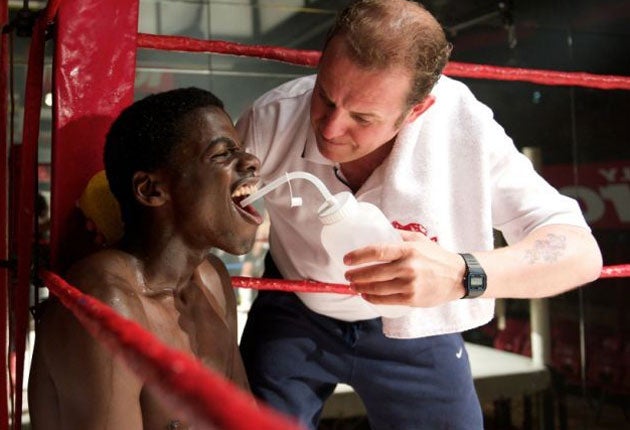Sucker Punch, Royal Court, London
A swipe at the legend of the ring

Your support helps us to tell the story
This election is still a dead heat, according to most polls. In a fight with such wafer-thin margins, we need reporters on the ground talking to the people Trump and Harris are courting. Your support allows us to keep sending journalists to the story.
The Independent is trusted by 27 million Americans from across the entire political spectrum every month. Unlike many other quality news outlets, we choose not to lock you out of our reporting and analysis with paywalls. But quality journalism must still be paid for.
Help us keep bring these critical stories to light. Your support makes all the difference.
Roy Williams seems to have a strange, metamorphic effect on the Royal Court. The main house was radically reconfigured as a sink estate seven years ago for Fallout, his excellent play written in response to the Damilola Taylor case. Now this same auditorium has been spectacularly transformed into a boxing arena, with the punters seated on either side of a central bloodstained ring, for his new piece, Sucker Punch, which has just opened in a brilliantly dynamic staging by Sacha Wares.
From the South African jazz musical King Kong to the American play The Great White Hope, theatre has vividly dramatised how this sport can be a painfully illusory route to liberation for an aspiring black man. Sucker Punch puts a 1980s twist on the theme. With the race riots as backdrop, it's set in a south London gym run by Nigel Lindsay's Charlie, a perennial loser and working-class Thatcherite. When his peevishly prejudiced, blue-eyed boy (Jason Maza) defects to another manager, he pins his ambitions on a couple of black teenagers. Mentored by Charlie, the compliant Leon (Daniel Kaluuya) goes on to win the British and European titles, but he's castigated as an "Uncle Tom" and bows to racist pressure by obediently dumping his out-of-bounds girlfriend, the boss's daughter. Enraged by the police and their Sus laws, rebellious Troy (Anthony Welsh) emigrates to the US where he's picked up by a leading black promoter. Cue a climactic bout between these estranged friends.
Trained to a startling peak of fitness by Errol Christie, Kaluuya and Welsh perform this head-to-head contest as a dazzling dance of simulated realism and rhythmic stylization, slipping effortlessly between an objective and a subjective presentation of the proceedings. Although borne along by humorously chippy dialogue, the play has the schematic plotting of a cautionary legend – and the diagram-like clarity of the staging metaphor, where the ring comes to feel more like another form of ghetto than a launch pad, drives home the crucial, discomfiting irony. The ruthless world of professional boxing offers only a fantasy of escape and independence to both youths.
Charlie may effectively have become a surrogate father to Leon, whose own dad (Trevor Laird) is the reverse of a role model (a layabout rogue and hypocritical white-skirt-chaser who places bets on the opposition if he thinks it will aid further womanising). The manager's solicitude, though, is far from self-interested and he'd rather throw a fight than contemplate a romance between a black boy and his privately educated daughter (a rather under-written character who functions as a device for exposing the emotional depths of Charlie's prejudice and the hopelessness with money that will become catastrophic as the recession bites). But the fur-wearing black American promoter (Gary Beadle) is no angel either, crudely revelling in his slave-owner control over Troy. In the old days, the latter had bridled at being called "boy"; now he's routinely branded as his boss's "bitch". As Leon's dad had warned him, sanctioned black-on-black violence can be a lucrative way of indulging white racism by proxy: "they love nuttin' better than to see two black men beatin' up on each other. They too afraid to do it themselves, so they get you to do it."
To 24 July (020 7565 5000)
Join our commenting forum
Join thought-provoking conversations, follow other Independent readers and see their replies
Comments